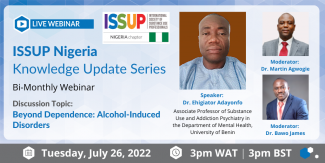Applying interventions designed to reduce and manage the symptoms of substance use disorders.
Treatment
Treatment of Opioid Use Disorder in Canadian Psychosocial Addiction Programs: A National Survey of Policy, Attitudes, and Practice
Abstract Objective To describe current approaches in treatment of opioid use disorder (OUD) within Canadian psychosocial outpatient, day, and residential addiction treatment programs, with an emphasis on the use of opioid agonist therapy...
Bi-Monthly Webinar: ISSUP Nigeria Knowledge Update Series (Thirteenth Session)
ISSUP Nigeria would like to invite you to attend their next Bi-Monthly Webinar in the Knowledge Update Series. The Webinar topic will be Beyond Dependence: Alcohol-induced Disorders. Learning Outcomes: • Sensitization to the wide range of...
Bi-Monthly Webinar: ISSUP Nigeria Knowledge Update Series (Thirteenth Session)
ISSUP Nigeria would like to invite you to attend their next Bi-Monthly Webinar in the Knowledge Update Series. The Webinar topic will be Beyond Dependence: Alcohol-induced Disorders.
Time: 3PM Nigeria Time | 3PM UK Time
Register for the Webinar
Learning Outcomes:

Treating co-occurring substance use and mental health disorders using tools from CBT
Presented by Jo Cassar (The Matilda Centre for Research in Mental Health and Substance Use, University of Sydney), by the end of this webinar, attendees will be able to: - Recognise the importance of assessing for substance use when a...
Eating disorders and AOD use: what clinicians need to know
Presented by Associate Professor Sarah Maguire (Director, InsideOut Institute), by attending this webinar, attendees will learn: - How to recognise the most common eating disorder symptoms; - Eating disorder interventions and how workers...
Personality disorders and AOD use: what clinicians need to know
Presented by Professor Brin Grenyer OAM, by the end of this webinar, attendees will be able to: - Identify personality disorders in the context of AOD challenges; - Select from various skills to effectively respond to people with concurrent...
Kenya to include smoking cessation drugs as essential medicines
The Ministry of Health has been advised to add two non-nicotine drugs to Kenya’s Essential Medicines List, to help smokers quit tobacco and nicotine addiction. The World Health Organization said the two drugs bring “a powerful shift in the...

'People do change' - The Blue Light Conference
Alcohol Change UK’s first national Blue Light conference
A full day of sharing expertise and experience about engaging with chaotic alcohol-dependent drinkers and supporting them to turn their lives around. This conference will introduce you to Alcohol Change UK’s Blue Light Project, how it works, and how you can start implementing it in your local area.
Evento SONEPSYN / ISSUP Chile: Chemsex
Este lunes 11 de julio, a las 20:00 hrs. se realizará la reunión académica del Grupo de Trabajo de Adicciones de Sonepsyn, junto a ISSUP-Chile.

Respiratory events associated with concomitant opioid and sedative use among Medicare beneficiaries with chronic obstructive pulmonary disease
Abstract Background Opioids and sedatives are commonly prescribed in chronic obstructive pulmonary disease (COPD) patients for symptoms of dyspnoea, pain, insomnia, depression and anxiety. Older adults are advised to avoid these medications...